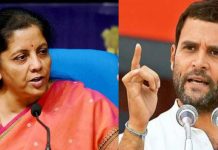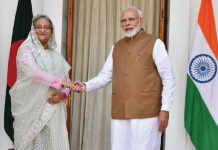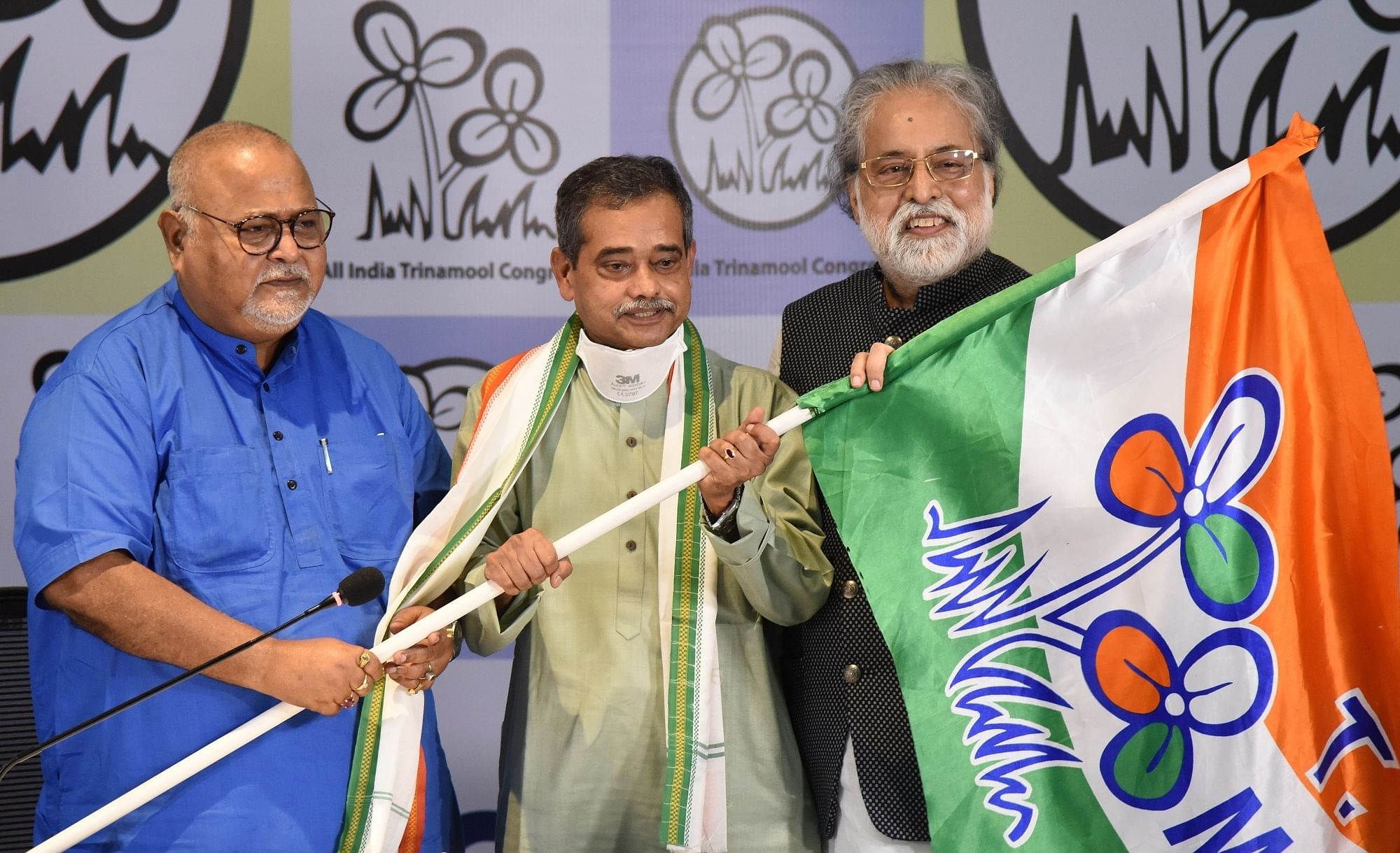
Already battered by repeated desertions, the Congress was dealt another blow when the 12 of the 18 party MLAs in Meghalaya jumped the ship and joined the TMC. Later, a political row erupted when TMC supremo Mamata Banerjee questioned the existence of UPA. A report by Amit Agnihotri
The Congress losing leaders to other parties over the past years has thrown up a question if such movements could be dubbed as desertions or riddance?
While the rivals allege that the Congress has been losing leaders as it can no longer provide them growth opportunities, the grand old party believes such persons left for good.
In politics, it is natural that a party will play down its leaders joining other parties to cover up internal problems while the rivals will highlight the development to score a point.
The Congress blames the desertions as the handiwork of BJP as well as the TMC, with whom it works against the saffron party in Parliament. The grand old party blames the BJP for engineering defections to weaken the Congress and accuses the TMC of trying to dent Opposition unity by luring away its leaders.
Over the past years, promising young leaders leaving the Congress usually got painted as a sign of weak central leadership whereas factional fights in the state units were the real culprit many a time.
The Congress is the only party in the opposition camp with a pan-Indian presence. Yet, desertions from the grand old party have continued for long and given rise to a question if the organization has become complacent since losing power at the Center in 2014?
Whatever be the truth, the issue is once again being debated in the public domain after 12 of 18 Congress MLAs in Meghalaya ditched the party and merged with the Trinamool Congress making TMC the main opposition party.
The leaders who switched parties included former chief minister Mukul Sangma, who was Leader of the Opposition in the Assembly and was reportedly unhappy with the central leadership over appointment of Shillong MP Vincent H Pala as state unit chief.
“Trinamool Congress has the potential to be the real alternative to BJP,” Mukul Sangma said after he joined the TMC.
Before that, team members of poll strategist Prashant Kishor were in Shillong to weigh in on TMC’s options ahead of the 2023 assembly polls. In 2012, the Meghalaya Pradesh Trinamool Congress was formally launched with an intention to contest 35 of the state’s 60 seats.
Days after the lawmakers quit, the Congress received another jolt in Meghalaya when its youth wing president Richard M Marak, a close aide of Mukul Sangma, quit the grand old party.
Marak, who was state Youth Congress chief, said: “I have been unhappy with the party for quite some time now due to the way the INC has been functioning. There is a structural defect in the INC.”
“This has already been highlighted many times in the past but there has been no attempt to rectify this. Instead, those who have pointed out these defects have been vilified. The last stroke was the appointment of the current president (Vincent Pala) who has no regard for the functioning of the party on Congress principles,” Marak said. He claimed that 500 other workers had quit the party across Meghalaya.
In fact, the trend of Congress losing state leaders had started in March 2020 when former union minister Jyotiraditya Scindia moved to the BJP and played a role in the fall of the Kamal Nath government, which had come to power in 2018. Scindia was rewarded with a BJP Rajya Sabha seat and is now a Union minister.
After Scindia left, there was speculation over another young leader Sachin Pilot in Rajasthan, who had differences with Chief Minister Ashok Gehlot, switching sides. But, the two patched up recently after a revamp of the state cabinet in which Pilot loyalists have been accommodated.
In August this year, former Lok Sabha member from Silchar in Assam and ex-All-India Mahila Congress chief Sushmita Dev moved to the Trinamool Congress. She is now a Rajya Sabha member from TMC.
Other young leaders who left the Congress before Sushmita are Jitin Prasada, who is now BJP minister in Uttar Pradesh and Pradyot Manikya Deb Barman in Tripura.
When the Congress was in power at the Centre, Jyotiraditya, Jitin and Sachin were made ministers in the UPA I and II governments to prepare them for future roles. After the Congress lost power, they played key roles in the party. Hence, their exit made news.
After the Congress lost the 2021 West Bengal assembly elections, Abhijit Mukherjee, son of former President Pranab Mukherjee moved to the TMC, which had defeated the BJP.
Before the state polls, Congress veteran PC Chacko joined the NCP, which is part of the LDF alliance in Kerala. The LDF defeated the Congress-led UDF and secured a second consecutive term in Kerala assembly polls this year.
A four-term Lok Sabha MP, Chacko has been in politics for at least four decades. He started his political life as an activist of the Congress’s student wing Kerala Students Union (KSU). He was elected as general secretary of the KSU in 1968, then became the president of the Youth Congress in Kerala in 1970.
Chacko was first elected to the Kerala Assembly in 1980 and became a minister in charge of Industries. He first became an MP in 1991. He was the Chairman of the Joint Parliamentary Committee which examined matters relating to Allocation and Pricing of Telecom Licences and Spectrum. His departure indicated division in the Kerala unit of Congress.
In September, former Goa chief minister Luizinho Faleiro left the Congress to join the TMC, which is trying to make inroads in the costal state. Like Sushmita Dev, he too is a Rajya Sabha member of TMC now.
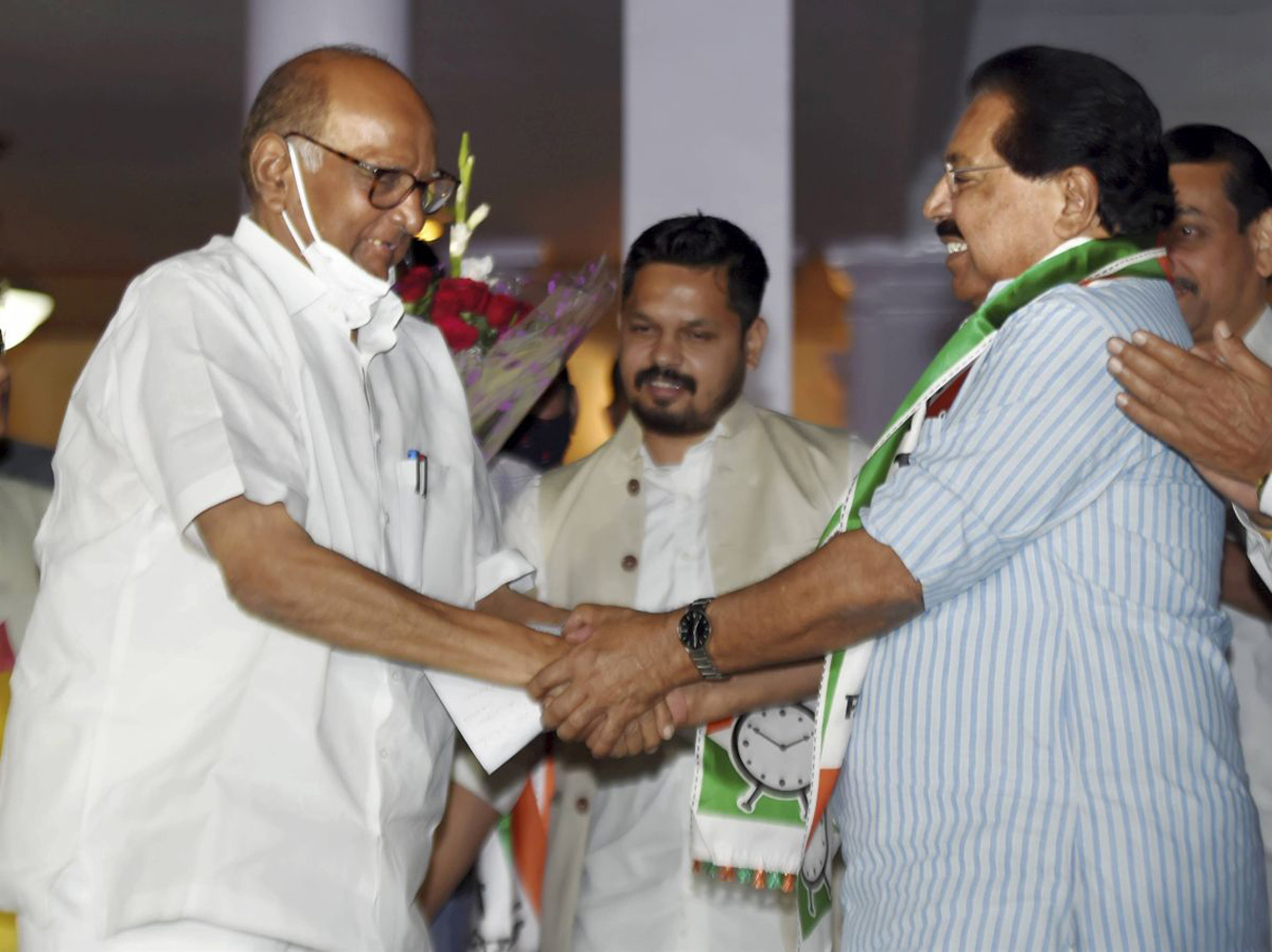
The migration from Congress continued when former UP lawmaker and senior leader Lalitesh Pati Tripathi left the party to join the TMC. Later, former Haryana Congress unit chief Ashok Tanwar, Delhi Congress leader Kirti Azad and former Janata Dal-United leader Pawan Varma too joined the TMC in the presence of Mamata Banerjee. Tanwar had formed his own Apna Bharat party after quitting the Congress.
Indicating trouble in Jammu, around 20 leaders belonging to the Ghulam Nabi Azad camp resigned from the Congress recently. Azad, who has been touring the region, denied he was floating a new political party but left everyone guessing by saying that nothing could be predicted in politics.
Recently, Azad had countered former union minister Salman Khurshid’s comparison of Hindutva ideology with that of Jihadist ISIS, saying it was wrong and exaggerated. Khurshid had made the comparison in his latest book “Sunrise over Ayodhya: Nationhood in our times.”
Many in the Congress fear that Azad might be getting support from the BJP just like former chief minister Amarinder Singh is getting in Punjab. Amarinder, who was forced to resign as chief minister, quit the Congress in November and floated his own political party Punjab Lok Congress, which is likely to join hands with the BJP for the 2022 assembly polls.
Punjab Aam Aadmi Party president Bhagwant Mann too recently claimed that a senior BJP leader had offered him money and a place in the Union cabinet if he joined the saffron party.
Without naming anyone, Mann, who is Lok Sabha MP from Sangrur, claimed the BJP had no base in Punjab and its leaders were not allowed to enter villages as they faced anger of farmers over the farm laws that were repealed by the Centre recently.
The AAP, which defeated the BJP in Delhi polls, is also vying for Goa to assert itself as a strong anti-BJP player over the Congress. The Congress had emerged as the single largest party in Goa in 2017 but the BJP forged alliances with smaller parties and formed the government. Later, 10 Congress MLAs joined the BJP, when the grand old party blamed the saffron party for murdering democracy.
Uninspiring party show to blame?
The desertions could be explained to the fact that the Congress has been out of power at the Centre since 2014 and has governments only in states like Punjab, Rajasthan and Chhattisgarh while it shares power in Maharashtra, Jharkhand and Tamil Nadu.
After ruling the Centre from 2004-14, the Congress lost power to the BJP in 2014. The party’s Lok Sabha tally came down from 206 in 2009 to 44 in 2014. The tally marginally improved to 52 in 2019. In between the party lost power in states like Maharashtra, Assam and Haryana. Though it won Punjab in 2017, Madhya Pradesh, Rajasthan and Chhattisgarh in 2018, the party lost MP to BJP in 2020.
In the assembly elections held this year, the party lost in Assam, West Bengal and Kerala again but managed to share power in Tamil Nadu as part of DMK-Congress alliance. In West Bengal the Congress joined hands with the Left front but stayed away from TMC.
This performance of the grand old party could have forced some leaders, who were dissatisfied over the state of affairs, to seek greener pastures. The central leadership may not be directly responsible for the exit of these young leaders but it must take lessons from such episodes which indirectly affect its image at a time when the party is trying to put up the face of a strong national opposition.
The young guns bite the bullet
Sushmita Dev headed the All-India Mahila Congress but had differences with former Assam unit chief Ripun Bora over alliance with AIUDF and distribution of tickets in the Barak Valley, her area of influence. She also cited lack of respect given to her by state leaders as one of the reasons to quit the Congress and move to the TMC. Now she is set to play a role in pushing TMC prospects in BJP ruled Tripura.
After losing the 2014 Lok Sabha polls, Jitin Prasada had been sidelined in the UP unit. Last year, he was given charge of West Bengal just a few months ahead of the assembly elections in 2021. He had started his own Brahmin Chetna Parishad to build up a community support base while still being in the Congress. He is now a UP minister.
Jyotiraditya Scindia had been assured the post of Madhya Pradesh state unit chief by Rahul Gandhi after veteran Kamal Nath was chosen as chief minister in 2018. In 2019, he was given charge of half of UP along with Priyanka Gandhi Vadra to revive the party.
Scindia felt sidelined in the state unit where former chief minister Digvijay Singh worked closely with Kamal Nath. The youngster got impatient, joined the BJP, helped the saffron party come to power, was sent to the Rajya Sabha and recently became a union minister.
Pradyot Barman resigned as Tripura unit chief following his differences with state in charge Luizinho Faleiro and the manner in which the party was being run in the north-eastern state.
Sachin Pilot was deployed by Rahul to revive the party in Rajasthan after the 2013 poll debacle. He worked hard and resurrected the party, which won the 2018 assembly polls but veteran Ashok Gehlot was made the chief minister and Sachin got to play his deputy. Later, he felt sidelined in the party and government system, and led a rebellion in 2020.
Mollifying the G-23 leaders
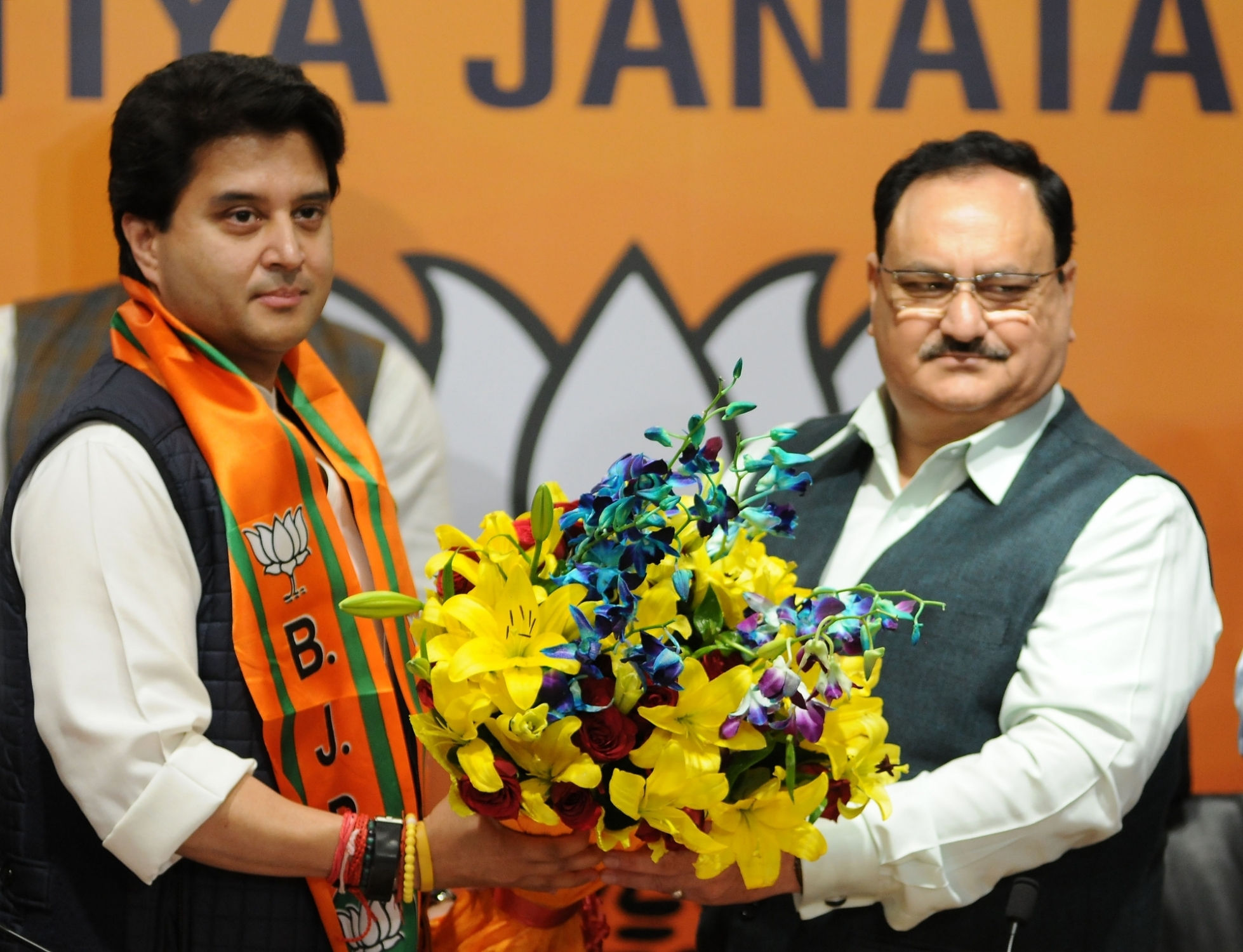
Congress losing state leaders and a string of elections had led to unease in the grand old party when a group of 23 senior leaders wrote a dissent letter to Congress interim chief Sonia Gandhi in August 2020, demanding a thorough revamp of the organization, a full time and visible president and elections for all party posts down to the block level.
The dissenters, who came to be known as the G23, were given a hearing through an online meeting of the Congress Working Committee, where they were targeted by Gandhi family loyalists for questioning the high command, but were also given an assurance that their concerns would be looked into.
However, nothing much happened and things moved at a usual pace till an organizational reshuffle was carried out in September in which a younger Jitin Prasada, one of the signatories to the dissent letter, was picked up, promoted as an All India Congress Committee General Secretary and given the uphill task of turning around the party’s fortune in West Bengal, which was to have assembly polls in April 2021.
The others, including the then Leader of the Opposition in the Rajya Sabha Ghulam Nabi Azad, who sort of led the G23, and his deputy in the upper house of Parliament Anand Sharma, who headed the party’s foreign affairs department, were left wondering if a long spell of isolation awaited them for writing the letter.
Azad’s membership of the Rajya Sabha ended in February this year and with no key party role given to him since August, it looked like the veteran would move to the margins till Sonia brought him back on May 11 to head the Congress Covid Relief Task Force.
In the September reshuffle, another veteran and signatory to the dissent letter Mukul Wasnik, was made in charge of Madhya Pradesh. Punjab Lok Sabha member Manish Tewari, who too had signed the dissent letter, had been active in Parliament since 2019 but was not much involved in the party affairs.
He was made a member of the panel reviewing the recent poll losses in Assam, West Bengal, Kerala, Tamil Nadu and Puducherry, the day Azad was named head of the Covid relief group.
In March, another G23 member and former Maharashtra chief minister Prithviraj Chavan too was given the sensitive task of screening the party’s candidates for the high stakes Assam assembly polls to benefit from his clean image.
The high command was concerned that any further delay in addressing the issues raised by the seniors might push them further away from the grand old party and may even induce them to damage the organization from within.
Party veteran Kapil Sibal, one of the key G23 members, had questioned the leadership over the Bihar assembly poll loss but did not attend the December meeting.
The leadership issue is finally going to be over in September next year when the Congress internal elections will culminate.
Oppn unity: Cong has its task cut out
The Congress, which is facing desertions, still feels it is the natural anchor of a national opposition grouping against the BJP but the TMC, which defeated the saffron party in the West Bengal assembly elections this year, is of the view that it is more suitable for the role.
After winning a third consecutive term as chief minister, Mamata Banerjee is looking at a greater national role and is expanding her party beyond West Bengal.
To begin with, the TMC is focusing on Tripura and Goa, which will have assembly elections in 2022. The TMC made a late entry in Goa and had to start by roping in Congress leader Luizinho Fareiro as it lacked organization in the state. For Tripura, the TMC roped in Sushmita Dev.
The two leaders joining the TMC has miffed the Congress which feels that the
regional party is deliberately taking its leaders. The TMC argues that the two Congress leaders were looking for a change and as a political party it gave them space.
The Congress also blames the TMC for dividing the anti-BJP votes in Goa, while the regional party argues that the Congress lacks aggression to defeat the BJP.
Many in the Congress believe that poll strategist Prashant Kishor, who had sought to join the Congress recently, is behind the former Congress leaders joining the TMC.
Kishor advised the TMC during the April assembly elections in West Bengal, and is now a poll strategist with the party.
The rift in opposition unity came out in the open when West Bengal chief minister Mamata Banerjee recently questioned the existence of Congress-led United Progressive Alliance. Separately, Kishor also took a dig at the grand old party saying it had no divine right to lead the opposition.
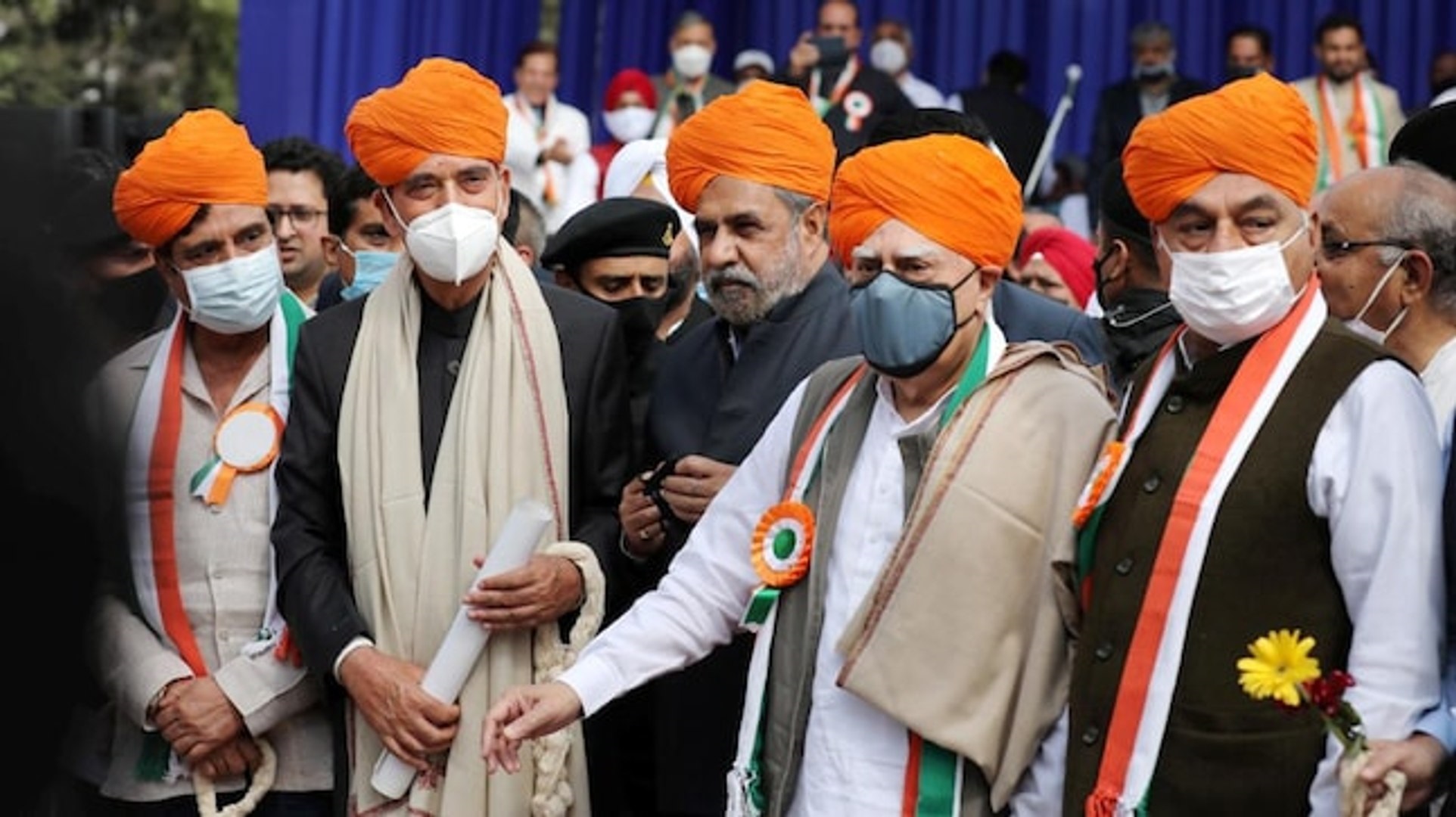
As part of her national projection, Mamata Banerjee travelled to Mumbai, where she met NCP chief Sharad Pawar and Shiv Sena leaders Aditya Thackeray and Sanjay Raut.
However, Raut later said that no opposition unity was possible without the Congress, to which the TMC responded by saying that it was only trying to pull the Congress out of its inertia and was all for the larger opposition unity.
“It is true that Mamata Banerjee finished the Congress, Left and BJP in West Bengal. But keeping Congress out of national politics will amount to strengthening the current fascist forces. It is understandable that (Prime Minister Narendra) Modi and his BJP feel that Congress should be wiped out. This is part of their agenda. But it is more dangerous when those fighting against Modi and his ideology think that the Congress should be wiped out,” said Shiv Sena mouthpiece Saamna.
Raut met Rahul Gandhi indicating growing bonhomie between the two parties and said that the Shiv Sena-NCP-Congress ruling alliance in Maharashtra represented a mini-UPA. He also questioned the need for too many opposition fronts saying the one led by Congress was enough. The Sena leader said he had urged Rahul to take lead on this front.
Though another Maharashtra ally NCP has been an old friend of the Congress, its chief Sharad Pawar remarked in September that the grand old party was behaving like zamindars of yesteryears whose lands had been taken away and who were not able to maintain their Havelis.
Interestingly, in poll-bound Uttar Pradesh the Samajwadi Party has snubbed the Congress and refused to forge a pre-poll alliance with the grand old party. SP chief Akhilesh Yadav’s comment that the Congress was likely to win zero seats in the coming UP assembly polls, irked party in charge Priyanka Gandhi Vadra, who quipped if the SP leader was an astrologer.
The Congress and the SP had joined hands for the 2017 assembly polls in UP but the alliance did not work out. Since then both the parties have been trying to recover lost ground. On her part, Priyanka has been trying hard to revive the Congress and present it as an option.
In Assam, the Congress joined hands with the AIUDF for the 2021 assembly polls but later dropped the partner as the pact did not work out. Before the polls, the Congress lost some leaders to the BJP. Earlier, the Congress had lost 9 lawmakers led by Himanta Biswa Sarma in 2014 to the BJP. Sarma was made deputy CM in 2016 and was promoted as chief minister this year.
Earlier, in August this year Congress chief Sonia Gandhi had sounded the poll bugle for the 2024 national elections and urged the opposition parties to rise above their compulsions and work together to take on the BJP.
Before the Parliament’s monsoon session, it was alleged that the Congress was delaying its leadership issue and was shying away from playing the role of an opposition anchor.
Things further changed by the time the Winter Session of Parliament started on November 29 when the TMC did not attend an opposition strategy meeting convened by Congress veteran and Leader of the Opposition in the Rajya Sabha Mallikarjun Kharge.
Kharge responded by saying it was up to the TMC to take a call in the matter but stressed that the need of the hour was greater opposition unity. He further said there was no question of severing ties with Trinamool Congress just because Mamata Banerjee had questioned the United Progressive Alliance.
The response of the Congress veteran showed that though the grand old party might be miffed over Mamata’s jibes, it was playing down the rivalry for now.







